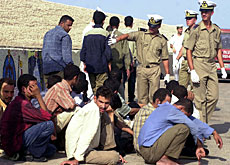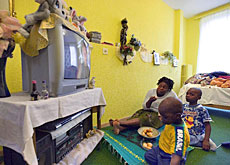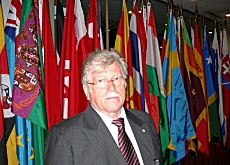Swiss guards may patrol southern EU borders

Swiss border guards may soon help keep watch over the European Union's southern flanks to stem the increasing flow of illegal immigrants, officials say.
The guards would be part of the EU’s Rapid Border Intervention Teams (Rabit), which is aimed at helping countries tackle the problem.
The sight of hundreds of weary-looking illegal immigrants landing in rickety boats on the EU’s southern shores has become much more commonplace in recent years.
Thousands make it to land, especially in the Canary Islands, Lampedusa and Sicily, and experts expect the number of illegal immigrants in the Mediterranean to increase.
“Demographic data shows that migration will increase because the total population of the 50 least-developed countries should pass the 800-million mark in 2007 and the 1.7-billion mark by 2050,” EU Justice, Freedom & Security Commissioner Franco Frattini said last March.
Although not a member of the EU, Switzerland has ratified the Schengen agreement, which will most likely enter into force in 2008-2009. Schengen is an agreement among European states which allows for the abolition of systematic border controls for those countries participating.
“As a result of the free movement of people and the opening of the borders in accordance with Schengen, the surveillance of the EU’s external borders has become extremely important,” Michaela Rickenbacher, chief of staff of the Swiss border guards, told swissinfo.
The country has agreed in principle to join the Rabit task force but its exact participation has yet to be finalised.
“It will most likely result in us putting a number of experts at its disposal,” said Rickenbacher.
“But it’s still too early to say what form our assistance will take as this has not been discussed at the political level,” she added.
Increase
The Rabit taskforce will consist of a number of teams of experts from EU and Schengen countries, totalling around 450 border guards.
They will be sent to assist individual states – which still retain sovereignty over their own border controls – in the event of emergencies such as last year when thousands of illegal immigrants reached Spain’s Canary Islands.
The new task force stems from Frontex, the European Agency for the Management of Operational Cooperation at the External Borders of the EU, which started operating in May 2005. The agency coordinates the exchange of information, guarantees uniformity of border controls and undertakes risk analysis.
As a direct measure resulting from the Schengen agreement, Switzerland will be obliged to participate. Failure could result in Brussels suspending the agreement in this particular field.
However, the Swiss authorities, and most other actors involved, have generally supported Swiss participation in the taskforce.
While the centre-left Social Democratic Party has expressed doubts over legal matters relating to data protection, political control and human rights, the three other political parties in government have all came out in favour of the idea.

More
Free movement of people
Schengen duty
“It is in Switzerland’s interest that the Schengen zone is more secure and controls on its outermost borders are really effective,” the Radical party commented.
The non-governmental Swiss Refugee Council is one of the few organisations that remains more sceptical.
“These controls will not only effect illegal immigrants but also people who genuinely need protection,” said Jürg Schertenleib, a spokesman for the organisation.
“We cannot just tighten controls at the borders. A mechanism needs to be found which allows legal access to Europe to these people by, for example, creating humanitarian contingents similar to those we are currently discussing for Iraqi refugees,” Schertenleib said.
“Switzerland cannot get out of Schengen and therefore has to collaborate with the EU. What we are asking Switzerland to do is to stress the humanitarian and human rights aspects,” he added.
swissinfo, based on an Italian article by Daniele Mariani
Frontex, the European Agency for the Management of Operational Cooperation at the External Borders of the Member States of the European Union, was created in 2004.
It is based in Warsaw, Poland, and started operations in May 2005. The agency has 70 members of staff but this figure should double by the end of 2007.
It has a budget of €35 million (SFr57 million) for 2007. The budget for the 2007-2013 period should be €285 million.
Switzerland contributes SFr1.9 million annually to Frontex.
Last summer border guards, ships and aircraft from a number of European countries participated in “Operation Hera” just off the Canary Islands.
This mission, Frontex claims, together with diplomatic action taken by Madrid together with West African states, helped drastically reduce the number of landings of illegal immigrants on the Spanish islands.
Patrols carried out from August 11 to December 15, 2006, led to the interception of 50 boats carrying 4,000 illegal immigrants. However, 15,000 still managed to make it to the islands.

In compliance with the JTI standards
More: SWI swissinfo.ch certified by the Journalism Trust Initiative




You can find an overview of ongoing debates with our journalists here. Please join us!
If you want to start a conversation about a topic raised in this article or want to report factual errors, email us at english@swissinfo.ch.